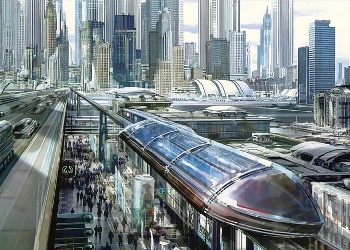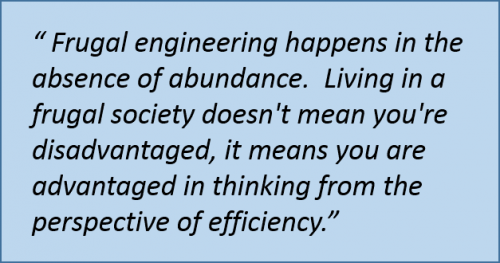Although humanity today seems dangerously close to a precipitous fall caused by an unmatched desire for growth, we also have before us the never-before-experienced ability to connect, transform, de-create and disrupt. What kind of a world will there be in the year 2064? Will our minds be reprogrammed to replace linear thinking with disruptive, audacious thinking? Will we dispel myths of creation and traditional control with networks that empower through connections and a common value system based on freedom of experience shared across social and geographic barriers? Will our world survive? The response to these questions is provided below through the following three perspectives:
- Perspectives from a panel of speakers made up of leading minds representing diverse populations and multiple age groups
- Perspective from the point of view of a software developer – a young man in his thirties
- Perspectives on alternative realities from a grade eight student – designer of a construct for a virtual country
Section “Dare to Imagine” Skoll World Forum commemorating the Forum’s 10th anniversary (YouTube video)
https://www.youtube.com/watch?v=QYK_BCgxEK8
In “Dare to Imagine,” the following panelists tackle the question of what they think the world would look like in fifty years:
Geoffrey West Theoretical Physicist
Joi Ito Disruptive Technology Innovator
Sarah Caddick Neuroscientist
Elon Musk New Energy Entrepreneur
Premal Shah Social Finance Architect
Shaifali Puri Collective Intelligence Strategist
Arianna Huffington New Media Entrepreneur
Sakeena Yacoobi Human Rights Entrepreneur
Tanishq Abraham Young Innovator
On the one hand, Joi Ito says, progress in the last 100 years has been “strong and ugly.” We have more, and have therefore ‘progressed;’ but as Confucius says, “more than enough is too much.” The kind of arrogance springing from the approach that we are smarter because we have more makes us blind to the fact that we don’t really understand the communities that we are trying to help. We are “fixing” things with “resources” rather than “understanding.” What we need is “frugal engineering” that happens “in the absence of abundance.”
Taking oil and burning it is like “using the furniture in your house as firewood,” says Elon Musk. We are “fundamentally changing the chemical makeup of the earth.”
We cannot keep up our demand for “open-ended, exponential growth.” Our system is “due to collapse,” says Geoffrey West.
On the other hand, the panelists argue, our world today is growing into “networks,” forming a “great unity of life.” We are becoming a “global neuro-network” where everyone is empowered to create, and where we move from “presentation to participation.” Today, a problem can be “crowd-sourced” and shared with people who had never even thought about the problem. We are collapsing geographic distances.
“People who write the songs and the culture of the day are going to change society more than those who are in charge of policy and the law.” (Joi Ito)
The problems facing our world are so large that they demand “disruptive thinking,” says Premal Shah. We don’t have time to think in incremental terms. We need to agitate, to inspire others. It’s time to challenge the status quo, and to “dare to imagine” our potential.
[N.B. Comments in “Dare to Imagine” are made collectively, and are at times in the form of voice-overs. Attempt has been made to be as accurate as possible in keeping with the rapid flow of ideas expressed by the panelists. For exact attribution, please refer to the above link for the YouTube video.]
………………….
The Future: “Let’s make it a good one!”
Here is the essence of my conversation with Monti Ghai, a Toronto software developer:
Nilambri: What do you think the world would be like in fifty years? Where do you think we are going?
Monti: It’s difficult to imagine what the world will be like fifty years from now. I haven’t even lived that long! How does one predict what technologies will be developed, what consequences they will have on society? I get a bit sheepish when making these kinds of prognostications, but it’s exciting to think about the future.
Computerized and networked devices are already ubiquitous – the smartphone leading the way. These trends will continue as our homes, cars and offices integrate further into ‘the cloud’. Self-driving vehicles, digital health records, and ‘smart’ prefixing every personal device and household appliance seem just around the corner. Wearable devices that connect us better to the world around us are already here, but what about spaceships that take us to worlds beyond?
All areas of science will benefit from the ongoing increase in computer speed, memory and networking. Allowing us to produce more food; live longer, healthier lives; and make dangerous jobs less risky. On the other hand, we will probably also have more efficient ways to kill and destroy.
Nilambri: What about facebook, twitter and social media?
Monti: Even though applications like facebook and twitter have significant impact on our current lives and culture, it’s hard to tell if they will still be around ten years from now. But the Internet is here to stay and the interfaces that allow us to engage in social media will continue to evolve in exciting ways.
We will of course become more dependent on our technologies; on machines and robots; our ‘systems’ and ‘grids’. Some professions will almost disappear; new ones will become necessary. This is nothing new; we’ve seen it happen before. I don’t know if our reliance on technology will make us more resilient or more fragile, but humans have been good at surviving. Feedback is part of the scientific method.
Perhaps climate change, globalization, war and depletion of resources will have a greater impact on the world than changes in technology. The interesting thing would be to see how technology is used to assist in managing these risks. Whatever happens, it is usually the poor that will face the brunt of any negative effects.
An increasing life span and a low birth rate also suggest that western countries will continue to rely on immigration to meet demands of the labour market. Urban life can be confusing, and stressful. It sometimes seems that culture is in constant flux, and our mental health rides the rollercoaster.
Nilambri: Will technology make our world any ‘safer?’
Monti: Advanced technological warfare will make traditional war less risky for American soldiers and their allies. Global conflict between major powers will be tempered by their inter-dependence, but irregular warfare will not go away, and the threat of terrorism will continue to influence government policy around security.
Nilambri: What changes will there be in education?
Monti: The Internet provides a way for people all around the world to access educational resources that we could not have dreamed of fifty years ago. Fifty years from now, these will be taken for granted. Billions of people in the developing world are waiting to benefit from this amazing potential, and I hope no one will stand in their way.
What will the world look like in fifty years? This question is inevitably a personal one. We ask what will we, or our children, be doing in fifty years? How will computers integrate further into our lives? Yet there are seven billion human beings living on our planet, and each one experiences the world in a unique way. Too many live on less than a few dollars a day and one-half of them are women who are prevented from reaching their potential. This is their world too. What will their lives be like? The great thing about the future is that it hasn’t happened yet; so let’s make it a good one.
………………..
Elliot Hegel’s Wolf Land: Revisiting history via the virtual construct of a country
Easier access to the Internet and technology are allowing us to establish parallel worlds as alternatives to what we see around us. Not only do these virtual environments have the potential to look forward, they can also revisit the past. Elliot Hegel, a grade eight student at Summit Alternative School in Ottawa, has developed the construct for one such country called Wolf Land. As Minister of Law and Ambassador to the United Nations, Elliot presents a legal case against the Vatican, seat of the Catholic Church, and as such, responsible for crimes against humanity committed during the Crusades and the Inquisitions.
“We, the prosecutor’s department of the country of Wolf Land, would like an investigation by the ICC in regards to which charges under the categories of Crimes against Humanity can and should be laid against the current Pope, as the representative of the Roman Catholic Church.”
Elliot addresses international unrest through the introduction of Bill #2 – a Conflict Resolution Act with the following Preamble:
“Whereas human history has had many conflicts. These conflicts could have been prevented through legal mediation or before a court of law… Too many lives have been lost due to a lack of an international mechanism that prevents conflicts… In recent years, 60,000 people have been killed in Syria; 21,227 in Iraq. In Afghanistan, around 34,500 civilians were killed.* Many of these deaths could have been prevented through international intervention.”
[* According to United Nations estimates, the numbers are much higher and continue to increase.]
In his February 2013 presentation to caucus members and guests of Canada’s New Democratic Party (NDP), Elliot describes history as “coming right at us.”
“We don’t often have a chance to be history….. But as the First Nations Child and Family Caring Society and the Assembly of First Nations present their case to the Canadian Human Rights Tribunal, we can all be there….. That’s history, and it’s coming right at us.”
Perhaps, later in life, Elliot will test the outcomes of Wolf Land policies in real terms. Would they work well in a world pulled between egalitarian principles of universal connectivity and the fundamentalism of ideologues looking for world domination? What is new about Wolf Land? How is it different from the many fictional worlds or Utopias that represent the ideal?
The difference lies in the capacity that a small concept such as Wolf Land has to reach out to “meet” history, and disrupt conventional wisdom. We do not as yet understand the power that lies within this movement. It can potentially work more efficiently and succeed where traditional weapons have failed. It can turn us into inter-connected and inter-dependent thinkers.











